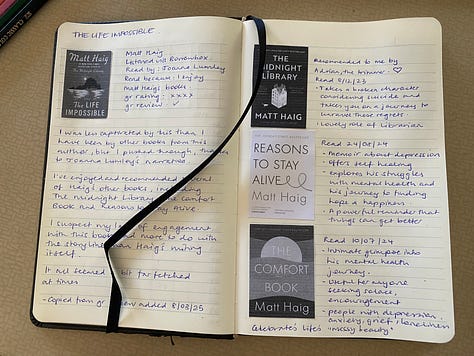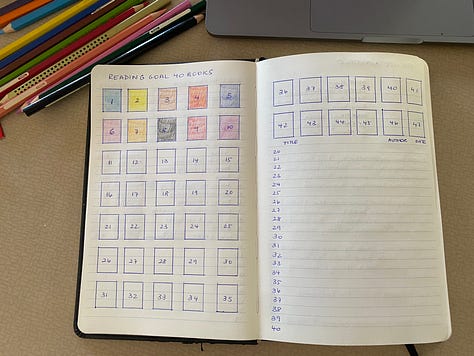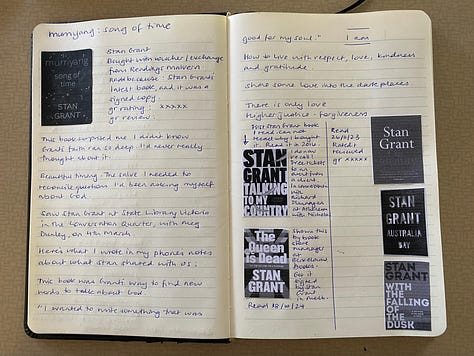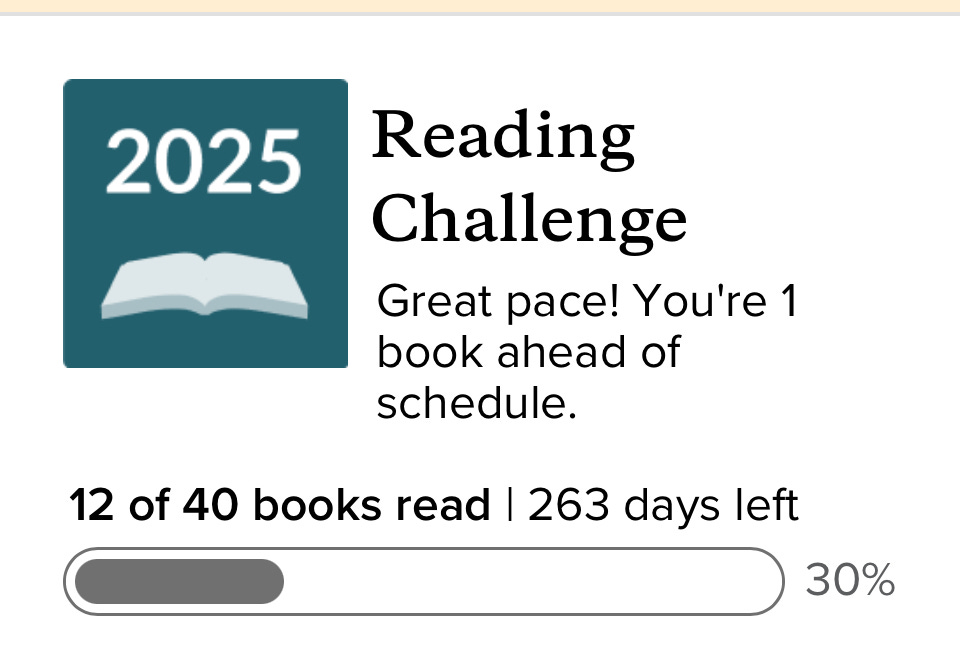I’ve started a reading journal dedicated to recording the many gems I discover in the pages of the books I’m reading. I wanted to move beyond my focus on writing an online book review, and to deepen my reflections as I collect the treasured words and ideas I discover on my reading journey.
Capturing my reading reflections in one place
The system I’ve been using to capture my thoughts and reflections, especially when reading a non fiction book, felt a bit ‘all over the place’. I’d write notes in whatever journal I was using when I’d finished reading the book.
If I own the book, then I make specific marks and notes on the edges of the pages with a pen or pencil. I will draw a heart, asterisk or multiple exclamation marks, depending on what my reaction is.
Many of the non fiction books I first borrowed from my local library, or enjoyed as an audio book on Borrowbox, can make it into my home library as a second hand copy I find in an op shop. I’m also guilty of being impatient and do occasionally order books from Amazon, as well as supporting my local bookshops. Yes - hypocrisy resides here.
Discovering a non-tech way to capture my thoughts and reactions in a dedicated journal so I can track my reading goals for the year, record the books I’ve read and include page references and notes for my reflections, has been a wonderful way to embrace a slow ritual that honours my reading habits.
For my first reading journal I selected a black notebook from the stash of journals and notebooks I’ve purchased or been given over the years. It’s ‘mock’ leather cover was starting to disintegrate, so I decided to cover it with leftover gift wrap. The vintage map illustration printed on this thick paper felt like a suitable theme to capture my reading voyages.
I enjoyed calling on skills I’d forgotten from days long ago when I covered school text books in clear self adhesive contact paper. Laying the paper and notebook on my kitchen table, I carefully positioned one on top of the other, using the scissors to cut the paper on an angle across the top of the notebook, so the edges could fold neatly, before being secured on the inside cover with tape.
The pleasant surprise has been how much I’ve enjoyed this process, marking out the squares at the front of the journal and colouring them in once I’ve finished reading a book. I’ve tended to do this in blocks of two or three books, finding images of each book online, printing them out on my black and white printer, and then pasting them into my reading journal.



This reading journal feels like a suitable home to capture the insights and quotes that call on my heart strings or adjust my settings, as all good books can and should. Isn’t that why we read?
In time, perhaps I will enjoy the non performative nature of my reading journal as the only main source to record my reflections about the books I read.
Reading as an intimate experience
The joy of reading lies in the deeply personal lens through which each reader interprets meaning. It can sometimes be difficult to honour all of the emotions I experience during the intimate exchange between an author and my individual reading experience when I share thoughts in a review or newsletter update about the books I’ve recently read.
These precious reading moments can illicit a smile or a pang in my heart when I feel seen or understood. I may need to pause and re-read a line over and over again to appreciate the beauty of the insight. Or I may experience a desire to put the book down and research the concept further.
These experiences are but a handful of the many reasons why I consider reading to be such a sacred and restorative practice.
And so I am resolved to write my deeper reflections in my reading journal, with the delightful comfort that no one is watching.
The pros and cons of online book reviews
Beyond the limitations of being able to capture the true essence of a book, or the author’s intention when writing a book recommendation or review, I can also feel constrained by the performative nature of sharing my thoughts while knowing other people are reading my reflections.
How can I possibly do justice to my unique reading experience while honouring the hard work of the author and publishing house? Surely the treacherous path that comes with the successful publication of a book is hard enough, without having to endure the thoughts and reactions of others.
While I understand that the publishing industry does not work this way, it feels like yet another example of how our systems may be a bit ‘out of whack’. Perhaps that’s why Substack and self publishing have become so popular.
Sometimes I will recommend a recent read or share my thoughts about a book in Think Bespoke’s monthly newsletter, here on Substack or as a book review on Goodreads. However, Goodreads has many flaws, which you can read about in these Guardian articles - It’s totally unhinged’: is the book world turning against Goodreads? (October, 2023) and God forbid that a dog should die’: when Goodreads reviews go bad (February, 2024).
The founders of Goodreads did not come from a background of literary criticism. The site was launched in 2007 by Otis Chandler, a computer programmer, and Elizabeth Khuri, assistant style editor for the Los Angeles Times’s Sunday magazine (the couple married in 2008). Goodreads was bought by Amazon in 2013 and now claims to be the world’s biggest site for readers and book recommendations.1
It’s not all bad, and what Goodreads does offer is the opportunity to track my yearly reading challenge; specifically - whether I am on track or not with the time that’s passed. And if I am off track, I like the feature that tells me how many books I need to read to catch up before the glorious week between Christmas and New Year, when I indulge in the last of the year’s ‘to read’ list.
Here’s how I’m tracking with my 2025 Reading Challenge. I’m currently reading Weathering, by
and Days at the Morisaki Bookshop, by Satoshi Yagisawa and translated by Eric Ozawa.My source of inspiration
I was inspired by the idea of a reading journal when I discovered this update from
. It includes images of her reading journal and a short video that takes us through her latest read, as part of her Agatha Christie Project.Please comment
What are you reading at the moment and how do you capture your thoughts, reflections and favourite quotes from the books you read?
With love and gratitude,
KPH
I acknowledge the Traditional Owners and Custodians of the lands on which I live and pay my respects to Indigenous Elders past, present and emerging. Sovereignty has never been ceded. It always was and always will be, Aboriginal land.
‘It’s totally unhinged’: is the book world turning against Goodreads? (October, 2023), by David Smith, published on The Guardian.









Reading journals a great way to reflect on your reading. I used to keep dedicated reading journals while I was at university but now that I have less time to dedicate to it I've incorporated it back to my regular journal and I've started a spreadsheet and digital journals that are easier to keep up with.
I love this Karen. And thank you for linking my post.